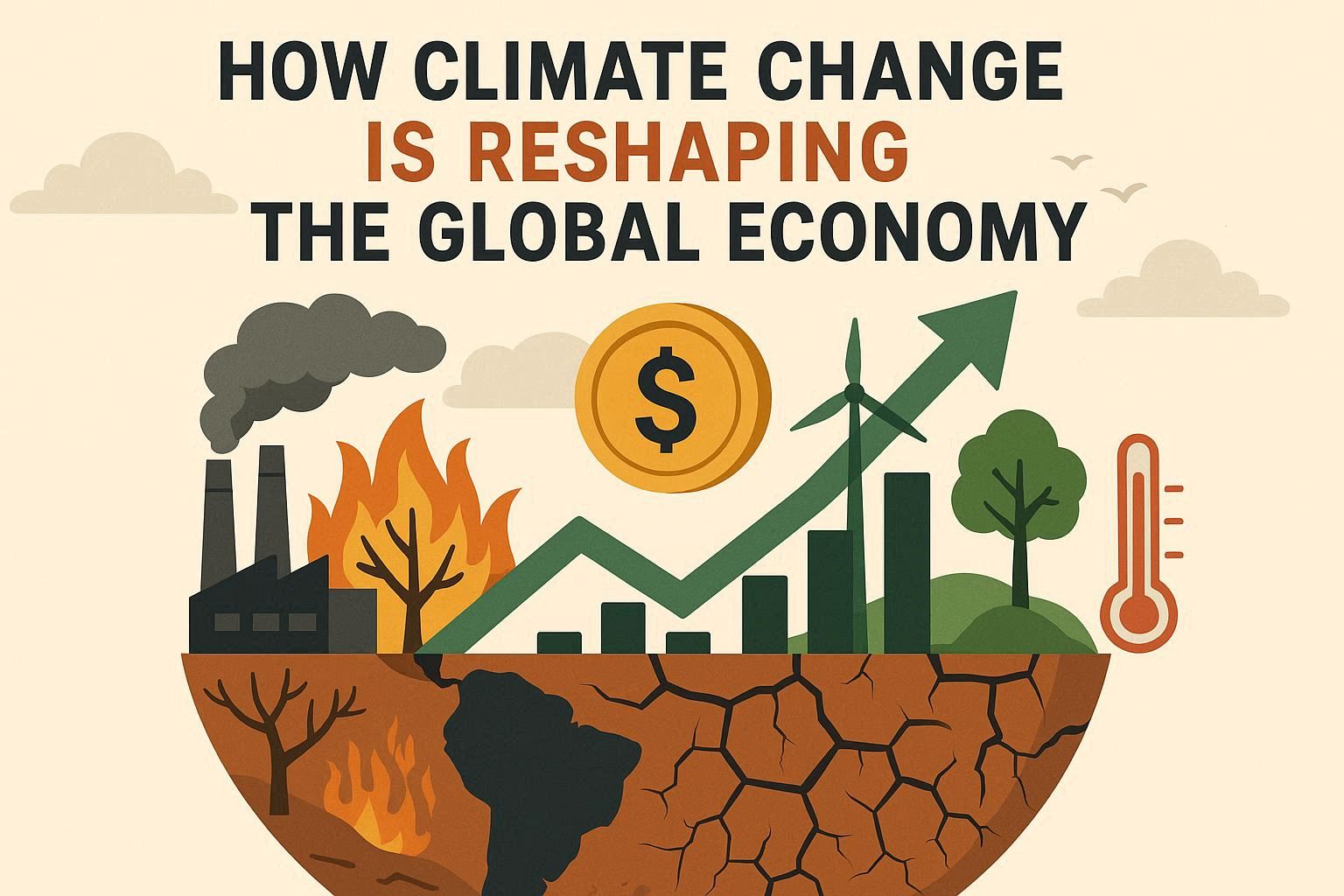Climate change is no longer just an environmental concern—it is now one of the biggest economic challenges of our time. Rising global temperatures, extreme weather events, and shifting natural resources are directly affecting industries, governments, and communities worldwide. In 2025, the economic consequences of climate change are becoming impossible to ignore, influencing agriculture, energy, insurance, real estate, and global trade.
This article explores how climate change is reshaping the global economy, the financial risks it creates, the opportunities for green growth, and the strategies that businesses and governments are adopting to adapt and thrive in a changing world.
1. The Economic Costs of Climate Change
Climate change already costs the global economy billions of dollars each year. These costs include:
- Extreme Weather Damage – Hurricanes, floods, wildfires, and droughts destroy infrastructure, reduce agricultural yields, and displace communities.
- Health Impacts – Increased air pollution and heat waves raise healthcare costs due to respiratory illnesses, heat-related deaths, and vector-borne diseases.
- Productivity Losses – Rising temperatures reduce worker productivity, especially in outdoor sectors like construction and farming.
- Supply Chain Disruptions – Climate-related disasters interrupt transportation networks and global trade.
The World Bank estimates that by 2030, climate change could push over 100 million people into extreme poverty unless action is taken.
2. Impact on Agriculture and Food Security
Agriculture is one of the most vulnerable sectors to climate change. Changes in rainfall patterns, soil degradation, and unpredictable weather create serious risks for global food production. Farmers face declining yields in crops like wheat, rice, and maize, especially in developing countries. Rising sea levels also threaten fertile coastal farmlands.
At the same time, opportunities exist for innovation in agriculture. Precision farming, climate-resilient crops, and sustainable irrigation systems are helping farmers adapt. However, these solutions require investment and global cooperation.
3. The Energy Transition and Global Economy
Energy production is both a major cause of climate change and a critical area for solutions. Fossil fuels still dominate global energy, but renewable energy sources like solar, wind, and hydropower are expanding rapidly.
- Economic Risks – Oil and coal-dependent economies may suffer financial instability as demand shifts toward clean energy.
- Opportunities – The renewable energy sector is creating millions of new jobs, reducing energy costs, and driving innovation.
- Global Competition – Countries investing in clean technologies today will gain a competitive advantage in the green economy of tomorrow.
The global energy transition will be one of the most significant economic shifts of the 21st century, influencing trade, geopolitics, and industrial development.
4. The Role of Insurance and Finance
The financial sector is also feeling the impact of climate change. Insurance companies face growing claims from climate-related disasters, making policies more expensive and harder to access. At the same time, investors are increasingly considering climate risks when evaluating companies and markets.
Green finance is on the rise, with governments and businesses issuing green bonds and investing in environmentally friendly projects. Sustainable finance is not just a moral choice—it is becoming a financial necessity.
5. Real Estate and Infrastructure at Risk
Coastal cities and low-lying areas face rising sea levels that threaten homes, businesses, and infrastructure. Real estate markets in high-risk areas may collapse, while demand grows in safer regions. Governments will need to invest trillions of dollars in resilient infrastructure to protect communities from flooding, storms, and heat waves.
Smart urban planning, sustainable construction, and climate-adaptive architecture will become essential to maintain economic stability in vulnerable regions.
6. Global Trade and Supply Chains
Climate change disrupts global trade by damaging ports, roads, and shipping routes. Melting Arctic ice, for example, opens new shipping lanes but also creates geopolitical tensions. Agricultural trade will also shift as traditional growing regions become less reliable.
Companies are already rethinking their supply chains, moving production closer to home or diversifying suppliers to reduce climate-related risks.
7. Opportunities in the Green Economy
Despite the risks, climate change also creates massive opportunities for innovation and growth. The green economy includes industries such as:
- Renewable Energy – Solar, wind, and geothermal power are rapidly expanding.
- Electric Vehicles – Global demand for EVs is driving growth in batteries and charging infrastructure.
- Sustainable Agriculture – Eco-friendly farming and plant-based foods are gaining traction.
- Green Construction – Energy-efficient buildings and smart cities are attracting investment.
According to the International Labour Organization, the green economy could create 24 million jobs worldwide by 2030, offsetting many of the losses from fossil fuel industries.
8. Policy and International Cooperation
Governments play a crucial role in shaping the economic response to climate change. Policies such as carbon pricing, emissions trading systems, and subsidies for renewable energy are being adopted worldwide. International agreements like the Paris Accord aim to coordinate global efforts.
However, challenges remain, as some countries resist transitioning away from fossil fuels due to short-term economic costs. Global cooperation will be vital to achieving sustainable growth and preventing further economic damage.
9. The Future of the Global Economy Under Climate Change
By 2050, the global economy will look very different if climate change continues unchecked. Entire industries could collapse, migration patterns may shift as regions become uninhabitable, and conflicts over resources like water and food could intensify.
On the other hand, proactive investment in clean technologies, resilient infrastructure, and sustainable practices could lead to a more balanced and resilient global economy. The choices made in the next decade will determine which path we take.
Conclusion
Climate change is not just an environmental crisis—it is an economic reality that affects every sector and every country. From rising insurance costs to agricultural disruption, from energy transitions to green innovations, its impact on the global economy is both a challenge and an opportunity.
Governments, businesses, and individuals must act decisively to adapt to this new economic reality. By investing in sustainable solutions, embracing green innovation, and cooperating on a global scale, we can not only reduce the risks of climate change but also unlock new pathways to economic growth and prosperity.

